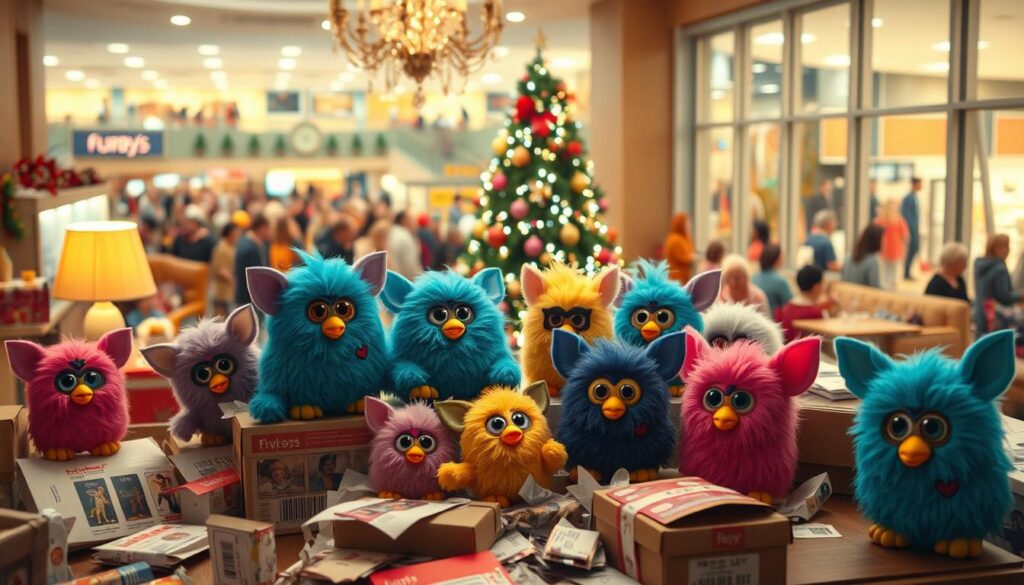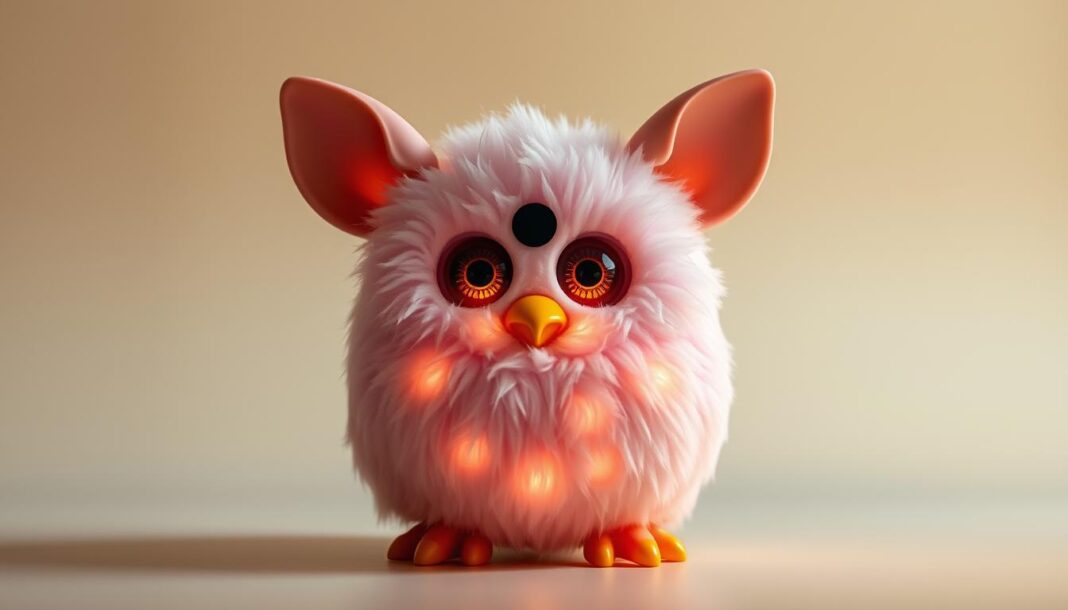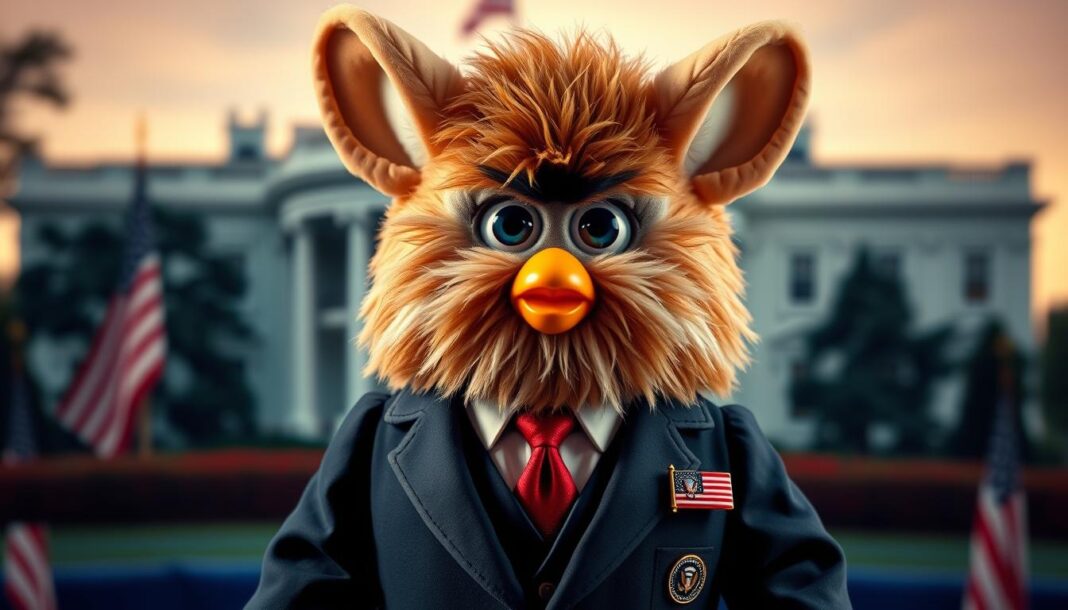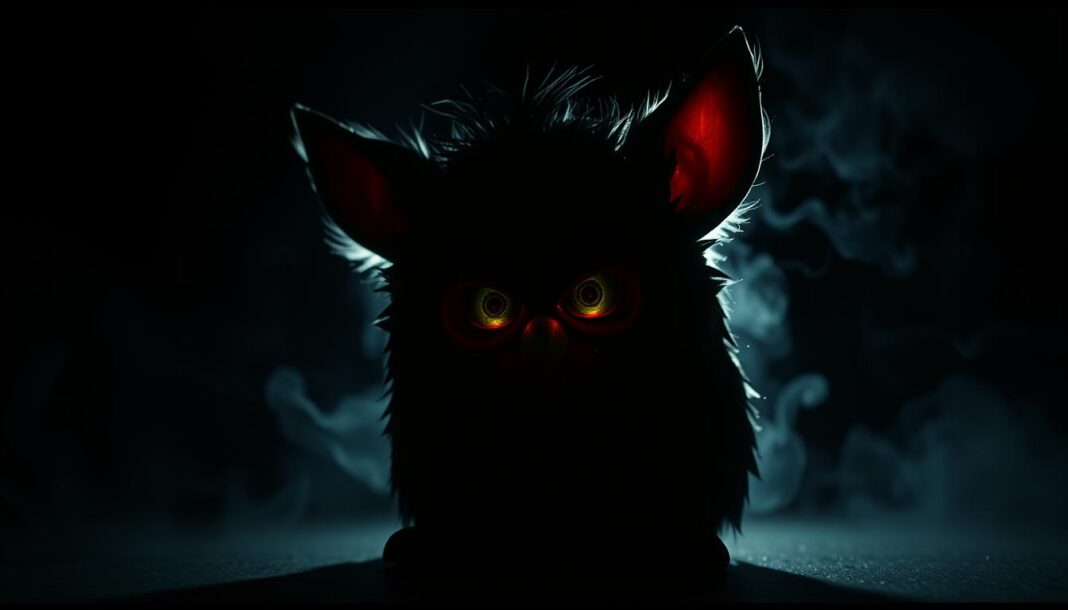Remember the toy that took the world by storm in the late ’90s? The original interactive pet became an instant hit, blending cutting-edge tech with adorable charm. Released by Tiger Electronics, a Hasbro subsidiary, this plush gadget quickly flew off shelves.
Priced at just $30-$35, it was affordable yet innovative. But holiday shortages sent resale prices soaring past $100. Over 40 million units sold worldwide, making it one of the most successful toys ever.
What set it apart? The ability to “learn” English from its unique Furbish language. With infrared communication and 24-language support, it paved the way for modern smart toys. For ’90s kids, it remains a cherished piece of nostalgia.
Introduction: Reliving the Furby 1998 Phenomenon
Engineered in just nine months by David Hampton and Caleb Chung, the original interactive pet debuted at the 1998 American International Toy Fair. Its blend of robotics and charm set the stage for a holiday mania that emptied store shelves nationwide.
By December, demand skyrocketed. Scalpers sold units for over $300—ten times the retail price. Auctions mirrored modern viral toy trends like Hatchimals, proving some crazes transcend time.
Rumors swirled about NSA bans, adding mystique. Though discontinued by 2002, adult collectors keep forums alive today. For many, those years marked a golden era of toy innovation.
Key Features That Made the 1998 Furby Revolutionary
Tiger Electronics redefined playtime with an AI-powered plush companion. Behind its fluffy exterior lay a 6502 microprocessor and TSP50C04 voice chip, enabling lifelike interactions. Here’s how it changed the game.
Adaptive Language Learning: From Furbish to English
The toy began speaking Furbish, a mix of gibberish and real words. Over time, it learned English phrases based on user interactions. With 42 Furbish words, it created 800+ unique phrases.
Interactive Sensors: Touch, Light, and Sound Responses
Three sensors made it feel alive:
- Tilt detection: Nodding or shaking triggered different reactions.
- Petting sensor: Stroking its back prompted purring.
- Sound reactions: It giggled when hearing loud sounds.
| Sensor | Response |
|---|---|
| Light | Squinted in bright light |
| Touch | Sang when belly rubbed |
| Sound | Repeated words in Furbish |
Infrared Communication: Talking to Other Furbys
An IR port let two toys “chat” by exchanging pre-recorded voice clips. Though scripted, it felt like magic to kids in 1998. MIT researchers later noted its processing power rivaled the Apollo lunar module.
The Rise and Fall of the Furby 1998 Craze
From store shelves to government watchlists, this toy made history. Its journey from must-have gift to banned item reveals how quickly hype can spiral.

Record-Breaking Sales and Holiday Mania
Demand exploded after its debut. In 1998, 1.8 million units sold. By 1999, that number skyrocketed to 14 million—a 678% increase.
Holiday shortages drove resale prices to $300. Parents camped outside stores, while scalpers dominated auctions. Hasbro struggled with supply chain delays, fueling the frenzy.
| Year | Units Sold | Notable Events |
|---|---|---|
| 1998 | 1.8M | Launch shortages |
| 1999 | 14M | Peak sales, global expansion |
| 2002 | Discontinued | Market saturation |
Why Furby Was Banned by the NSA and Pentagon
In January 1999, the NSA banned it from secure facilities. Officials feared its microphone could record classified information. Though unfounded, the rumor spread globally.
London customs destroyed 20,000 counterfeit units. Hasbro adapted designs for markets like Sweden (“Furbee”). By 2002, oversupply ended the craze—but not its legacy.
Technical Breakdown: How the Original Furby Worked
Peek behind the plush exterior to discover the engineering marvel that powered this iconic toy. Tiger Electronics packed advanced mechanics into a palm-sized package, blending robotics with charm.
Inside the Camshaft Gear Assembly and Motor
A camshaft-driven system controlled movements like ear wiggles and eye blinks. The motor synchronized with a Sunplus SPC81A microcontroller, allowing precise animations.
Hackers later found ways to modify gears for custom motions. Regional factories used slightly different parts, making some models rarer today.
Voice Synthesis and the TSP50C04 Chip
The TSP50C04 chip used linear predictive coding to generate lifelike sounds. It stored 800+ phrases across three adjustable pitch levels.
Factory resets altered the voice tone, a feature few owners discovered. With just 128B RAM, it optimized memory by shutting down after inactivity.
- Power-saving: Auto-off after 5 minutes idle
- Circuit bending: DIY mods added new sounds
- Regional tweaks: Japanese units had softer fur
Why the Furby 1998 Remains a Collector’s Dream
Unopened boxes of this ’90s sensation now command premium prices. Over two decades later, enthusiasts pay up to $500 for mint-condition units. The combination of nostalgia and rarity fuels an active secondary market.
Treasure Hunting for Limited Editions
Among 22 special editions, some stand out as holy grails. The unreleased Lion prototype for Generation 10 sells for four figures. McDonald’s 1999 Shelby promotion items also draw fierce bidding.
Preservation challenges add to the hunt. Battery corrosion often damages vintage units. Experts recommend:
- Storage: Keep in climate-controlled environments
- Restoration: Use erasers to clean contact points
- Display: Remove batteries to prevent leaks
Evolution of Interactive Features
The 2016 new Furby introduced app connectivity but lost the original’s mechanical charm. Later models replaced moving parts with LCD eyes. Many collectors prefer the tactile feedback of early versions.
| Feature | 1998 Version | 2023 Version |
|---|---|---|
| Language Learning | Furbish to English | Pre-programmed phrases |
| Connectivity | Infrared only | Bluetooth + app |
| Market Value | $300-$500 (NIB) | $60-$80 retail |
Hasbro’s 2023 Furby Furblets marked a return to simplicity. These smaller companions echo the original’s spirit without complex tech. For purists, nothing beats the authentic experience.
The Enduring Legacy of a 90s Icon
Few toys have left such a lasting cultural footprint as this ’90s phenomenon. It appeared in Transformers comics and nearly became a movie. Fans still debate its fictional 125-year lifespan lore, proving how deeply it embedded itself in pop culture.
Over the years, mint-condition units became prized collectibles. Museums now display them as examples of retro-tech innovation. Meanwhile, enthusiasts maintain online databases with repair guides and software emulators.
Its influence echoes in modern companion robots, though none match its mechanical charm. Fan communities keep its spirit alive through restoration projects and cultural assessments. This plush pioneer remains a benchmark for interactive play.


